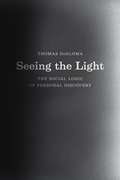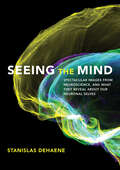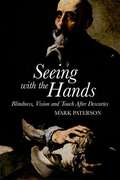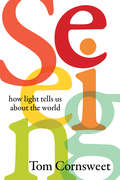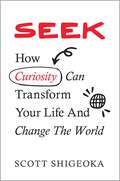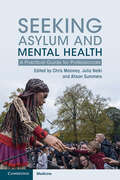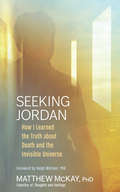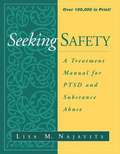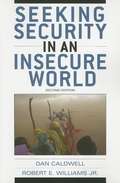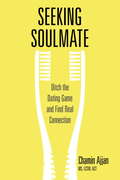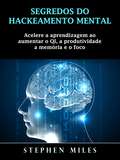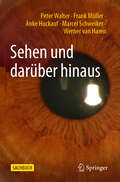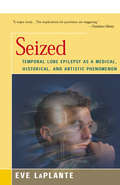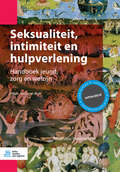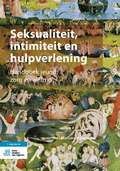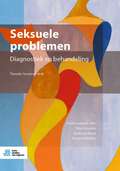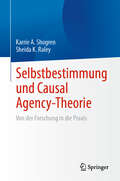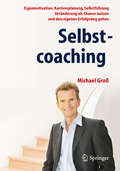- Table View
- List View
Seeing the Light: The Social Logic of Personal Discovery
by Thomas DeglomaThe chorus of the Christian hymn "Amazing Grace" reads, "I once was lost, but now am found, / Was blind but now I see. " Composed by a minister who formerly worked as a slave trader, the song expresses his experience of divine intervention that ultimately caused him to see the error of his ways. This theme of personal awakening is a feature of countless stories throughout history, where the "lost" and the "blind" are saved from darkness and despair by suddenly seeing the light. In "Seeing the Light," Thomas DeGloma explores such accounts of personal awakening, in stories that range from the discovery of a religious truth to remembering a childhood trauma to embracing a new sexual orientation. He reveals a common social pattern: When people discover a life-changing truth, they typically ally with a new community. Individuals then use these autobiographical stories to shape their stances on highly controversial issues such as childhood abuse, war and patriotism, political ideology, human sexuality, and religion. Thus, while such stories are seemingly very personal, they also have a distinctly social nature. Tracing a wide variety of narratives through nearly three thousand years of history, "Seeing the Light" uncovers the common threads of such stories and reveals the crucial, little-recognized social logic of personal discovery.
Seeing the Mind: Spectacular Images from Neuroscience, and What They Reveal about Our Neuronal Selves
by Stanislas DehaeneA lavishly illustrated and accessibly explained deep dive into the major new findings from cognitive neuroscience.Who are we? To this age-old question, contemporary neuroscience gives a simple answer: we are exquisite neuronal machines. Each of our dreams, thoughts, and feelings arises from a pattern of activity in our brain. In Stanislas Dehaene&’s Seeing the Mind, we learn not only that the mind maps onto the brain, but that it is just a complex electrical motif on the tapestry of our neurons. In this richly illustrated and highly accessible book, Dehaene uses the power of brain images to tell the story of centuries-old efforts to understand who we are, and how it is possible that our thoughts emerge from just three pounds of flesh. Seeing the Mind is divided into one hundred topics, each described by a spectacular full-page color image and, on the facing page, a brief text that explains what this image means and why it matters. By weaving together images and text, the book brings readers into the intimacy of their own brains. As Dehaene explains, &“All the gorgeous biological processes that you are about to discover are taking place, right now, inside your own brain.&” A modern cabinet of curiosities, Seeing the Mind is an intriguing and memorable read that will astonish readers with a direct, face-to-face meeting with themselves—and with the material stuff of their thoughts and dreams.
Seeing with the Hands: Blindness, Vision and Touch After Descartes (Edinburgh University Press)
by Mark PatersonDrawing upon the writings of Descartes, Voltaire, Locke and others, the author reflects upon the philosophical understanding of blindness and what it suggests about the nature of perception. Central to the discussion is the Molyneux Question first posed in 1688: "Suppose a man born blind, and now adult, and taught by his touch to distinguish between a cube and a sphere of the same metal, ... and the blind man be made to see: whether by his sight before he touched them, could he now tell which is the globe and which the cube?" Patterson discusses cases of people blind from early in life who have had vision restored through surgery, and explores the similarities and differences between visual and tactile perception. The final chapter examines the autobiographical writings of blind authors including Helen Keller, John Hull, and Georgina Kleege, and how such works are understood by sighted readers.
Seeing: How Light Tells Us About the World
by Tom CornsweetWritten by one of the pioneers in visual perception, Seeing provides an overview of the basics of sight, from the anatomy of the eye, to optical illusions, to the way neural systems process visual signs. To help readers better appreciate the most-used of our five senses, Tom Cornsweet describes the early physical and physiological processes that occur in human vision in relation to the forces of evolution. He also includes answers to common questions about vision—including those that many of us ask during a visit to an eye doctor—to illustrate how the study of vision can provide a better understanding of one’s everyday relationship with sight.
Seek: How Curiosity Can Transform Your Life and Change the World
by Scott ShigeokaMaximize your potential for connection, healing, and personal growth with this &“timely bridge for our divided world.&” (Adam Grant, #1 New York Times bestselling author of Hidden Potential)"We've been hiding from each other for far too long. Seek offers us an empathic, practical, and heartfelt road map forward." ―Seth Godin, author of The Song of Significance and Tribes If you've felt alienated and alone in recent years, you're in good company. Whether it's a rift in your family, polarization at your workplace or just a sense that society isn't as connected as it once was, many of us feel painful chasms in our connections. Internationally-recognized curiosity expert and bridge builder Scott Shigeoka knows that there&’s only one cure: Deep Curiosity. Rooted in a desire to understand, rather than to know, a practice of Deep Curiosity can help us leverage something we think of as an intellectual force or personality trait into a heart-centered daily practice to transform our well-being and our lives. In Seek, Shigeoka blends cutting-edge research with electric, vulnerable storytelling to teach readers their signature DIVE model. With his guidance, you&’ll learn more than a dozen practical strategies to: Detach — Let go of your ABCs (assumptions, biases, certainty), Intend — Prepare your mindset and setting, Value — See the dignity of every person, including yourself, Embrace — Welcome the hard times in your life. &“Energizing, creative, and exciting&” (Gretchen Rubin), Seek is a revolutionary playbook to heal division, loneliness, estrangement, hatred, and our most urgent societal challenges.
Seeking Asylum and Mental Health: A Practical Guide for Professionals
by Chris Maloney Julia Nelki Alison SummersPeople seeking asylum face unique challenges and frequently experience mental health problems. Effective support requires an understanding of their mental health needs in the broader context of their lives, cultures and extreme experiences. This book provides practical guidance for professionals and services working with people seeking asylum in mental health, social care, legal, government. managerial and commissioning roles. With authors from a wide range of professional backgrounds, the book is enriched by accounts from people with first hand experience of the asylum system itself. It considers the challenges and dilemmas faced by all involved, including clients, clinicians and service planners, with a wealth of practical information about how to assess and understand strengths and needs, avoid inappropriate conclusions and discrimination, consider treatment options, and write records and reports. The authors emphasise that effective support depends on reflection, humanity and compassion. The book is a must-have resource for professionals working with those who have to seek asylum.
Seeking Jordan
by Matthew MckayIf you have lost someone you deeply love, or have become strongly aware of your mortality, it’s hard to avoid wondering about life after death, the existence of God, notions of heaven and hell, and why we are here in the first place. The murder of Matthew McKay’s son, Jordan, sent him on a journey in search of ways to communicate with his son despite fears and uncertainty. Here he recounts his efforts -- including past-life and between-lives hypnotic regressions, a technique called induced after-death communication, channeled writing, and more. McKay, a psychologist and researcher, ultimately learned how to reach his son. In this book he provides extraordinary revelations -- direct from Jordan -- about the soul’s life after death, how karma works, why we incarnate, why there is so much pain in the world, the single force that connects us, and our future as souls. Unlike many books about after-death communication, near-death experiences, and past-life memories, this is a book for those who do not believe yet yearn to know what happens after death. In addition to being riveting reading, Seeking Jordan is a unique heart-, soul-, and mind-stirring reflection on the issues each of us will ultimately face.
Seeking Molecular Biomarkers for Schizophrenia Using ROC Analysis
by Margareth Borges Coutinho GalloSchizophrenia Spectrum Disorders (SSD) manifest multidimensionally, presenting a syndromic nature with several symptomatic domains. These are driven by dynamic systemic biological changes that unfold over the course of the disease. Thus far, the diagnosis is solely based on symptoms, which may be rather subjective, moving research toward the search for SSD biomarkers. This book presents a summary of the main hypotheses that have evolved over time to explain the pathophysiology of SSD and that have driven the discovery of associated biomarkers: neurotrophic, neurotransmitter, neuroendocrine, immune-inflammatory, nitrosative/oxidative stress, metabolic, and gut microbiota-brain axis. The book shows the most relevant research carried out in the last twelve years to develop predictive, diagnostic, theranostic or transdiagnostic models based on these biomarkers using the receiver operating characteristic curve (ROC) analysis. Chapters also discuss how the literature has addressed the development and/or addition of new discriminatory biomarkers to achieve robust and successful results. The book is rounded out with a step-by-step explanation on how to work on the MetaboAnalyst platform, including the meaning of the chosen statistics and how to interpret them in the results obtained. This book is a useful resource for students and scientists involved in the discovery of biomarkers for psychiatric disorders and other diseases.
Seeking Peace in El Salvador
by Diana Villiers NegroponteThe resolution of the civil war in El Salvador coincided with the end of the Cold War. After two years of negotiations and a decade-long effort to implement the peace accords, this work questions how peace was made and whether it has endured.
Seeking Safety: A Treatment Manual for PTSD and Substance Abuse
by Lisa M. NajavitsThis much-needed manual presents the first empirically studied, integrative treatment approach developed specifically for PTSD and substance abuse. For persons with this prevalent and difficult-to-treat dual diagnosis, the most urgent clinical need is to establish safety-to work toward discontinuing substance use, letting go of dangerous relationships, and gaining control over such extreme symptoms as dissociation and self-harm. The manual is divided into 25 topics, each of which forms the basis for one or more sessions. Covering a range of cognitive, behavioral, and interpersonal issues, topics include highly practical tools and techniques to engage patients in treatment; teach "safe coping skills" that apply to both disorders; and restore ideals that have been lost, including respect, care, protection, and healing. Structured yet flexible, sessions can be conducted in any order and in a range of settings. The volume is designed for maximum ease of use with a large-size format and helpful reproducible handouts and forms.
Seeking Security In An Insecure World
by Dan Caldwell Robert E. WilliamsThis comprehensive yet concise introduction to international security explores the constantly changing conditions that lead to an insecure world. During the Cold War, the Soviet-American nuclear rivalry generated insecurity. Since then, state-based nuclear threats have diminished while the threat of non-state actors wielding weapons of mass destruction has increased. A global surge in mass-casualty terrorism, persistent and costly intrastate wars, and environmental threats have reshaped our thinking about security threats and how best to respond to them.
Seeking Soulmate: Ditch the Dating Game and Find Real Connection
by Chamin AjjanTransform dating and the often-fraught search for a fulfilling relationship into a fun, exciting adventure using mindfulness techniques and practices. Dating is a 2 billion dollar industry. Everyone, it seems, is looking for love but for so many it is an endless struggle. In Seeking Soulmate: Ditch the Dating Game and Find Real Connection, Brooklyn-based therapist Chamin Ajjan offers a fresh perspective to this universal pursuit. With a friendly, funny, and informative approach, Ajjan applies the evidence-based theories of Cognitive Behavior Therapy and mindfulness meditation practice to the negative behaviors, thoughts, and patterns that cause dating distress. Every stage of the dating process, from finding someone to date, to developing a relationship, has its own particular difficulties. Seeking Soulmate shares case vignettes, relatable characters, and personal experiences from Ajjan's clinical experience to illustrate how the personal insight gained with practicing mindfulness can transform the anxiety, negative thoughts, and overall hopelessness that accompanies the unsuccessful pursuit of love into fun, rewarding, exciting dating adventures. Ajjan provides an explanation for dating difficulties, a foundation for practice, and practical exercises to create real change. These methods are available to everyone, regardless of age, socioeconomic status, ethnic, cultural, or religious background, or sexual orientation. Seeking Soulmate will help you develop the most important benefit of mindful dating: the ability to let your genuine, most attractive self emerge. This is how real relationships with the actual staying power are formed.
Seelische Gesundheit im Langzeitverlauf - Die Mannheimer Kohortenstudie
by Matthias Franz Heinz Schepank Klaus LieberzDie Mannheimer Kohortenstudie ist eine der aufwändigsten Untersuchungen zu Ursachen und Prognosen psychischer Erkrankungen weltweit. 600 Mannheimer der Jahrgänge 1935, 1945 und 1955 wurden über viele Jahre hinweg begleitet und untersucht. Der Band stellt die Ergebnisse der drei Jahrzehnte währenden, weltweit einzigartigen Längsschnittuntersuchung vor. Um die Ergebnisse im Zusammenhang mit den jeweiligen politischen und sozialen Veränderungen deuten zu können, wird der Text von einem Historiker kommentiert, auch eine Probandin kommt zu Wort.
Segredos do Hackeamento Mental: Acelere a aprendizagem ao aumentar o QI, a produtividade, a memória e o foco
by Stephen MilesDescrição do livro - Segredos do hackeamento mental: Acelere a aprendizagem ao aumentar o QI, a produtividade, a memória e o foco. Por: Stephen Miles Descubra os segredos que os profissionais utilizam para otimizar suas mentes! Baseando-se em décadas de estratégias testadas, esse e-book irá mostrar-lhe a maneira mais rápida e eficaz para melhorar sua memória. Você aprenderá como aumentar sua cognição e seu QI em apenas algumas horas. E não somente isso, você se tornará mais focado, realizará mais objetivos e terá mais energia do que nunca. Quer saber como as melhores e mais brilhantes mentes conseguem se desempenhar em níveis tão elevados? Mesmo considerando sua inteligência na média, você também poderá aprender os segredos para alcançar um alto desempenho. Este guia ensina técnicas comprovadas para melhorar a sua memória. O que está incluso: -Programa de treinamento eficiente e rápido. -Como aumentar a produtividade. -Como aumentar a memória. -Como aumentar o foco. -Como aumentar a inteligência em geral. + MUITO MAIS! Se você quiser treinar a sua mente na melhor maneira possível, este livro é para você. --> Role até o topo da página e clique em adicionar ao carrinho para comprar Aviso: Este autor e ou o detentor dos direitos autorais não reivindica, assegura ou garante a exatidão, integridade ou adequação das informações disponíveis neste livro e, por conseguinte, rejeita expressamente qualquer responsabilidade por erros ou omissões presentes nele, em razão de ser somente para referência. Por favor, consulte um profissional antes de realizar qualquer uma das sugestões encontradas nesta obra. Gênero: Psicologia/Neuropsicologia Gênero secundário: Psicologia/referência Língua: Português Palavras-chave: memória, cérebro, hackear, jogos, aprendizagem, mais rápido, produtivo, concentração, foco, Q
Seguro en los brazos de Dios: La verdad celestial acerca de la muerte de un niño
by John Macarthur«¿Está mi bebé en el cielo?». Esa es la pregunta másimportante que un padre o madre que sufre puede hacerse. Y aunque el pequeñosea el hijo de otra persona, la pregunta permanece: ¿Qué les sucede a losniños, a los no nacidos, los mortinatos o los infantes, cuando mueren? ¿Podemosesperar volver a verlos? ¿Podemos soltar el temor y la culpabilidad? ¿Puede elamor de Dios suavizar una herida tan desgarradora? Con autoridad bíblica y lacalidez del corazón de un pastor, el autor de éxitos de librería John MacArthurexamina el alcance de toda la Biblia y revela en este convincente libro elcuidado que tiene el Padre celestial de cada vida. «He estado sentada junto a la tumba de nuestra hija y nuestro hijo,y me he preguntado en voz alta si mi fe en que Hope y Gabriel están en el cielotiene algún apoyo bíblico sólido. John MacArthur ofrece verdad de la Palabra deDios que resuelve las dudas de cualquier padre o madre que sufre esta pérdida. Seguro en los brazos de Dios revela quela confianza del cielo para el hijo al que amas está basada en mucho más quemero sentimentalismo; está revelada en la Palabra de Dios, y refleja el propiocorazón de Dios». --Nancy Guthrie, autora de Aferrándose a la esperanza
Sehen und darüber hinaus
by Peter Walter Frank Müller Marcel Schweiker Anke Huckauf Werner van HarenSehwahrnehmung ist eine zentrale Fähigkeit des Menschen und nahezu aller Tiere. Der Sehsinn hat sich schon früh in der Entstehungsgeschichte der Lebewesen entwickelt und ständig weiter perfektioniert. Für die Informationsvermittlung, Kommunikation und Interaktion ist der Sehsinn von großer Bedeutung und der Verlust des Sehvermögens wird als besonders starke Einschränkung des Lebens begriffen, erlebt und befürchtet. Und trotzdem sind unsere Sinne für uns selbstverständlich und werden erst dann bewusst wahrgenommen, wenn es zu einer Störung durch eine Erkrankung kommt. Dieses Buch soll dazu beitragen, Sehen als solches zu verstehen und den Einfluss unserer Sehwahrnehmung auf verschiedene Bereiche des Lebens, wie Gesundheit, Wohlbefinden, Wohnen, Kommunikation und Verstehen, zu erkennen. Zu diesem Zweck haben sich die fünf Autoren aus verschiedenen Wissenschaftsgebieten ausgetauscht. Sie beschreiben den Sehsinn aus Sicht ihres jeweiligen Fachgebietes und diskutieren über Aspekte des Sehens besonders an den Schnittstellen ihrer Fächer.
Seized: Temporal Lobe Epilepsy as a Medical, Historical, and Artistic Phenomenon
by Eve LaplanteSeized is a narrative portrait of a common brain disorder that can alter personality, illuminating the mind-body problem and the limits of free will. An invaluable resource for anyone touched by epilepsy, Seized gives first-hand accounts of three ordinary patients with temporal lobe epilepsy (TLE), explaining what they suffer and how they cope. The book also tells the stories of creative luminaries diagnosed with or suspected of having TLE, including van Gogh, Dostoevsky, Lewis Carroll, Saint Paul, and Flaubert. The psychological implications of Seized are, according to Publishers Weekly, "staggering." Kirkus Reviews called the book "Fascinating . . . LaPlante's descriptions of the human brain are wonderfully concrete, her historical research is well presented, and her empathy for TLE's victims is clear." In this "fascinating account of medical research," Howard Gardner noted, "LaPlante shows how a brain scar may cause bizarre aggressive or sexual behavior--and works of profound creative imagination."
Seksualiteit, intimiteit en hulpverlening: Handboek jeugd, zorg en welzijn
by Mathieu HeemelaarWerkers in de hulpverlening, dienstverlening en verpleging hebben op veel manieren te maken met seksualiteit en intimiteit. Veel cli#65533;nten kampen met problemen op het seksuele vlak, die vaak niet onderkend worden. Seksueel misbruik blijkt hoog in de hulpverlening. De grenzen in de intieme omgang tussen hulpverlener en cli#65533;nt zijn onderwerp van gesprek in instellingen en opleidingen. Dit boek biedt de basisinformatie over seksualiteit en intimiteit, die bekend moet worden verondersteld voor een professionele omgang met cli#65533;nten. Professioneel optreden stoelt ook hier op twee zaken: kennis van zaken en de vaardigheid om te praten over seksualiteit. Seksualiteit, intimiteit en hulpverlening bundelt actuele kennis uit de vakliteratuur over seksuele ontwikkeling, verstoringen in seksuele ontwikkeling, intimiteit, seksuele en relationele vorming, seksueel misbruik, preventie van misbruik en methodisch werken. Het boek bevat communicatietraining die studenten en hulpverleners door middel van studietaken en praktijkvoorbeelden aanzet tot reflectie en gesprek. Mathieu Heemelaar geeft naast een aanzienlijke hoeveelheid weetstof ook een groot aantal voorzetten en handreikingen, op weg naar een intiem klimaat, dat bescherming biedt, maar dat ook doorzichtig is. Dat is moedig en baanbrekend. Frits Wafelbakker in het voorwoord.
Seksualiteit, intimiteit en hulpverlening: Handboek jeugd, zorg en welzijn
by Mathieu HeemelaarDit boek is al 25 jaar hét handboek over seksualiteit, intimiteit en hulpverlening. Het bevat actuele informatie over seksuele ontwikkeling en seksuele gezondheid in alle levensfases, bij alle doelgroepen in de hulpverlening en bij elke seksuele gerichtheid en genderidenteit. Het is een basis voor de professionele omgang met cliënten, en helpt hulpverleners om hun beroepshouding verder te ontwikkelen. Het boek richt zich primair op hbo-studenten sociaal werk, pedagogiek, verpleegkunde en toegepaste psychologie, en op professionals in Gezondheidszorg, Jeugdwerk en het Welzijnswerk. Deze zesde druk van Seksualiteit, intimiteit en hulpverlening - Handboek jeugd, zorg en welzijn is compacter dan zijn voorgangers. Zo blijft het boek leesbaar en betaalbaar. Tegelijk bevat het door uitbreiding van de ondersteunende website wél fors meer informatie, omdat het op tal van punten is aangevuld en herzien. Het boek biedt materiaal waarmee de lezer leert om handelingsverlegenheid te overwinnen, te praten over seksualiteit, en te reflecteren op eigen normen en waarden. Ook bevat het verhelderende, kleurrijke illustraties van Marco Swaen. Seksueel grensoverschrijdend gedrag is een groot probleem. In dit boek worden de nieuwste inzichten in effectieve, sekspositieve preventie weergegeven. Studenten en daarmee hun cliënten leren met dit boek hoe je beter communiceert over gewenste seks. De zesde druk van het boek is opgedragen aan Ellen Laan, hoogleraar seksuologie, die helaas begin 2022 is overleden. Zij heeft baanbrekend onderzoek verricht naar vrouwelijke seksualiteitsbeleving. Haar inzichten hebben een prominente plaats gekregen in deze druk.Mathieu Heemelaar was hogeschooldocent seksualiteit aan de opleidingen Sociaal Werk, Pedagogiek en Pabo van De Haagse Hogeschool. Tijdens zijn pensioen blijft hij actief als adviseur seksualiteitsonderwijs.
Seksuele problemen: Diagnostiek en behandeling
by Peter Leusink Gertruud Borst Yvonne MerkiesDit boek is een praktische handleiding bij het diagnosticeren en behandelen van seksuele problemen. De probleemgerichte en uniforme hoofdstukopbouw geeft houvast aan allen die in de klinische praktijk werken met mensen met seksuele problematiek. Stapsgewijs wordt onderscheiden welke interventies bij welke klacht passend zijn. Het boek biedt de seksuologische hulpverlener een praktisch naslagwerk in aanvulling op bekend veronderstelde kennis die zoveel mogelijk is geactualiseerd. Voor de niet-seksuologische professional biedt het boek een compact overzicht van noodzakelijke kennis om te kunnen diagnosticeren en vormt het een basis voor eenvoudige interventies en voor het adequaat verwijzen naar de seksuologische hulpverlening. Het boek is een herziening van het in 2010 gepubliceerde boek Seksuele disfuncties. Diagnostiek en behandeling. De hoofdstukken over seksuele disfuncties zijn geactualiseerd en drie hoofdstukken zijn toegevoegd: Hyperseksualiteit, Parafilie en Genderdysforie. De toegenomen inzichten in definitie, concept, diagnostiek en behandeling van deze problematiek, en de behoefte vanuit de klinische praktijk om meer houvast en eenduidigheid, zette ons tot deze uitbreiding aan. Tevens zijn vignetten aan elk hoofdstuk toegevoegd om de klinische toepassing te illustreren. Naast de tekst bevat elk hoofdstuk een beslismatrix waarin de te volgen strategieën in diagnostiek en behandeling beknopt worden weergegeven. De matrix duidt aan welke interventies bruikbaar zijn, mede afhankelijk van de complexiteit van het probleem en van de competenties waarover de clinicus beschikt. Diverse interventies zijn online beschikbaar. Redactie Dr. P. (Peter) Leusink, huisarts, seksuoloog NVVS, supervisor NVVS, docent, werkzaam bij de Seksuele Zaak, Utrecht Drs. G. (Gertruud) Borst, GZ-psycholoog/psychotherapeut, seksuoloog NVVS, systeemtherapeut NVRG, supervisor NVVS en NVRG, docent, werkzaam bij GGZ PsyQ Beverwijk Drs. Y. (Yvonne) Merkies, klinisch psycholoog/psychotherapeut, supervisor EMDR en VGCt, docent, manager behandelzaken bij Sinai Centrum
Selber denken kostet nichts: Wie Sie leere Parolen entlarven und lernen, sich selbst zu vertrauen
by Jürgen W. GoldfußTschakka! Ein oft gehörter Ausruf, wenn es um Motivation, Machbarkeit und Erfolg geht. Aber so einfach ist es nicht. Manch plakative Weisheiten gewisser Erfolgsgurus und Motivationstrainer entpuppen sich als heiße Luft. Banale Tipps für Wege aus der Jobkrise oder dem Leistungstief werden geschickt vermarktet und teuer verkauft. Auf das professionell inszenierte Motivations- und Stimmungshoch solcher Events folgt jedoch nicht selten die Ernüchterung. Oft scheitern die verheißungsvollen Erfolgstipps an den Grenzen des Berufsalltags. Schlimmstenfalls verfestigen sich Empfindungen wie Frustration oder Hilflosigkeit noch stärker als zuvor. Doch es geht auch anders. Der Autor Jürgen W. Goldfuß räumt auf mit leeren Erfolgsversprechen und wohlklingenden Worthülsen. Sein Credo: Jeder Mensch verfügt in sich selbst über ausreichend Know-how, um ein Leben ohne Stress und Burnout zu führen. Jeder hat ein ganz eigenes Repertoir an Werkzeugen, um sich immer wieder neu zu motivieren, selbst zu vertrauen und zufrieden zu leben. Der erfahrene Publizist, Berater und Hobby-Kabarettist unterstützt Sie mit nachvollziehbaren, leicht umsetzbaren Tipps. Unterhaltsam beleuchtet er alltägliche sowie außergewöhnliche Situationen und zeigt, wie Sie daraus Gewinn ziehen und Ihre eigene Persönlichkeit stärken können.
Selbst im Alltag: Qualitative Sekundäranalysen zu Identitätskonstruktionen im Wechselverhältnis von Normierung und Selbstentwurf
by Thomas Kühn Sabine Beckmann Patrick Ehnis Marina Mohr Katrin VoigtMithilfe von Sekundäranalysen qualitativer Interviews – geführt zwischen Ende der 1980er und Anfang der 2000er Jahre – analysieren die Autor*innen, wie sich gesellschaftliche Prozesse in der Arbeitswelt, im Geschlechterverhältnis sowie Einflüssen von Individualisierung, Aktivierung und Selbstoptimierung in der Konstruktion des Selbst niedergeschlagen. Erzählungen über Arbeit, Beziehung und Lebensführung verbinden die Autor*innen mit soziologischen und sozialpsychologischen Ansätzen zu Identitäts- und Subjektkonstruktionen. Dabei zeigen sie, wie der Kampf um Anerkennung, Autonomie und Authentizität, wie Zeitnutzungsdiskurse sowie Männlichkeits- und Weiblichkeitskonstruktionen das Alltagsleben und Lebensentscheidungen formen – stets im Spannungsfeld zwischen Unterordnung und Selbstermächtigung. Kritisch wird untersucht, wie Identitäts- und Subjektkonstruktionen mit der (Re)Produktion und (De)Legitimation sozialer Ungleichheitsverhältnisse zusammenhängen.
Selbstbestimmung und Causal Agency-Theorie: Von der Forschung in die Praxis
by Karrie A. Shogren Sheida K. RaleyDieses Buch führt die Causal Agency-Theorie als Rahmen zur Definition von Selbstbestimmung ein und beschreibt deren Entwicklung sowie wesentliche Merkmale. Es fasst die Forschung zur Förderung und Verbesserung der Selbstbestimmung zusammen und untersucht die praktischen Implikationen im Kontext von Behinderung über den Lebensverlauf. Das Buch hebt auch zukünftige Richtungen für Theorie, Forschung und Praxis in den Bereichen positive Psychologie und Behinderung hervor. Wichtige Themenbereiche umfassen: Theoretische Grundlagen der Entwicklung von Selbstbestimmung sowie Forschungsergebnisse und praktische Implikationen über den Lebensverlauf. Fragen im Zusammenhang mit der Umsetzung evidenzbasierter Praktiken zur Förderung von Selbstbestimmung im Kontext von Behinderung. Mögliche Strategien zur Überwindung von Barrieren für Selbstbestimmung durch forschungsbasierte Praktiken. Zukünftige Richtungen zur weiteren Integration der Causal Agency-Theorie in Interventionen der positiven Psychologie sowie in Unterstützungsstrukturen bei besonderen Beeinträchtigungen. Selbstbestimmung und Causal Agency-Theorie ist eine unverzichtbare Ressource für Forscher, Professoren und Graduiertenstudenten sowie für Kliniker, Therapeuten und andere Fachleute in den Bereichen Entwicklungs- und positive Psychologie, Bildungsrichtlinien und -praxis, Sonderpädagogik, Sozialarbeit, Ergotherapie, Sprach- und Sprachtherapie, öffentliche Gesundheit und Gesundheitspolitik.
Selbstcoaching: Eigenmotivation, Karriereplanung, Selbstführung - Veränderung als Chance nutzen und den eigenen Erfolgsweg gehen
by Michael GroßDas Berufsleben stellt uns immer wieder vor schwierige Entscheidungen, gewollte oder ungewollte Veränderungen, Konflikte, Phasen der Über- oder Unterforderung u.v.m. Wer heute erfolgreich sein will, sollte über Fähigkeiten verfügen, die uns helfen, diese Herausforderungen zu meistern: Selbstführungstechniken, Flexibilität, Veränderungsmotivation, Mut, ein "Gefühl für die Situation". Glücklicherweise sind diese Skills in jedem von uns angelegt! Dieses Buch will Ihnen helfen, sie herauszulocken und zu optimieren. Sie können es komplett lesen, oder Sie greifen danach, wann immer Sie vor einem konkreten Problem stehen: Teil 1 gibt Impulse, Ihre Motive, Stärken, Schwächen, Erwartungen zu analysieren und Ihre Ziele zu schärfen. Die Kapitel in Teil 2 gehen jeweils von typischen Situationen einer Berufskarriere aus, von der Berufswahl über Konfliktsituationen bis hin zu Gesundheitsproblemen, und helfen Ihnen, Schritt für Schritt Ihre ganz persönliche Herausforderung zu meistern. Teil 3 enthält einen Selbsttest: Wie steht es um meine Selbstführungs-Skills? Geschrieben von einem, der es wissen muss: Michael Groß ist nicht zuletzt durch seine Fähigkeit zur Selbstführung zum mehrfachen Schwimmolympiasieger und -weltmeister geworden und hat danach den Wandel vom Sportler zum promovierten Kommunikationswissenschaftler vollzogen. Durch seine heutige Tätigkeit als erfolgreicher Berater hat er die Praxiserfahrung, anderen seine "Skills" weiterzugeben. Lassen Sie sich durch seine Tipps und viele Beispiele aus der Biografie des Autors motivieren, die nächste Herausforderung in Angriff zu nehmen!
Selbstdisziplin in 365 Zitaten: Zitate für jeden Tag – ändere deine Gewohnheiten, stärke deinen Geist, erreiche deine Ziele
by Xabier K. Fernao„Wir sind, was wir immer wieder tun. Vorzüglichkeit ist daher keine Handlung, sondern eine Gewohnheit.“ – Aristoteles Was ist der wichtigste Faktor, der zwischen Armen und Reichen, Erfolgreichen und Erfolglosen, Glücklichen und Unglücklichen unterscheidet? Selbstdisziplin. Denk mal darüber nach. Wenn du disziplinlos im Beruf bist, häuft sich bald die Arbeit auf, und am Ende bist du gestresst und ausgebrannt. Wenn du disziplinlos mit deinem Geld umgehst, häufst du unnötige Kosten und Schulden auf und bist am Ende finanziell gestresst und ausgebrannt. Du siehst, worauf ich hinauswill. Aber wieso ein Buch mit „Selbstdisziplin in 365 Zitaten“? Stimmst du mir zu, dass Erfolg zu 80% von der Einstellung und nur zu 20% von Strategien und Mechanismen abhängt? Du siehst, worauf ich hinauswill. Die Leute jagen immer den 20% nach, den unrealistischen Dingen, und denken, dass die EINE große Idee sie zu disziplinierten Menschen machen wird. Aber so ist es nicht. Es sind die täglichen Impulse, Eingebungen und nicht zuletzt das Umfeld, die einen jeden Tag aufs Neue zur Disziplin motivieren. Ich weiß nicht, was du dir vorgenommen hast. Vielleicht ist es deine Traumfigur, der Waschbrettbauch, den du immer schon haben wolltest. Vielleicht ist es dein beruflicher Durchbruch, eine Null mehr hinter dem Jahreseinkommen. Es ist auch egal. Was ich aber über dich weiß: du bist jemand, der mehr will. Und das ist ziemlich großartig. Du willst mehr Geld, mehr Gesundheit, mehr Glück, mehr Sex, mehr Lebensfreude, mehr Wissen und mehr Freiheit… und daran ist absolut nichts verkehrt. Im Leben geht es darum, zu wachsen und sich weiterzuentwickeln. Wir können entweder jeden Tag ein bisschen wachsen oder jeden Tag ein bisschen sterben. Ich finde es unglaublich bewundernswert, dass du den Weg bergauf gewählt hast, den Weg des Wachstums und der Selbstdiszip
